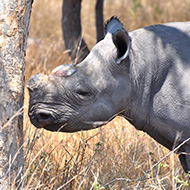Study adds to evidence for dehorning black rhinos

“In an ideal world no one would want to remove arguably one of the most iconic features of a rhino" - Lucy Chimes, University of Bristol Veterinary School.
A new study has found no evidence that dehorning has a negative impact on black rhinos.
Black rhinos are listed as a critically endangered species by the International Union for Conservation of Nature (IUCN), with poaching for their horns posing a constant threat to their survival.
A number of African country reserves now dehorn rhinos to act against poaching, yet few studies have explored the impacts of the process, particularly among the black rhino species.
Building on previous knowledge of population growth between dehorned and horned rhinos, researchers examined four sub-populations of black rhino in Namibia. Of these, three populations had undergone some form dehorning at least once, and one population had never been dehorned.
Specifically, the team measured the age of females at the birth of their first calf; average time between the birth of calves for each female; birth sex ratios, calf survival, life span and cause of death.
Their study revealed no statistically significant differences in key factors of population growth between dehorned or horned black rhinos - a finding that is encouraging for the continued use of dehorning as an anti-poaching technique.
It has previously been suggested that dehorning rhinos could impact upon their biology and behaviour, either through losing their horns or from the dehorning process itself - which requires the animal to be sedated.
The study was led by researchers at the University of Bristol, together with the Save the Rhino Trust and the Namibian Ministry of Environment, Forestry and Tourism.
Lucy Chimes, former MSc student from the University of Bristol Veterinary School, said: “In an ideal world no one would want to remove arguably one of the most iconic features of a rhino, its horn, but unfortunately this is not an ideal world and relentless poaching has forced many reserves to resort to dehorning.
“Our study found there were no statistically significant differences in any of the measures of population productivity evaluated between dehorned and horned rhinos, which is reassuring for the use of dehorning as an anti-poaching deterrent in black rhinos.”
The study, ‘Effects of dehorning on population productivity in four Namibia sub-populations of black rhinoceros (Diceros bicornis bicornis)’, is published in the European Journal of Wildlife Research.



 The Veterinary Medicines Directorate (VMD) is inviting applications from veterinary students to attend a one-week extramural studies (EMS) placement in July 2026.
The Veterinary Medicines Directorate (VMD) is inviting applications from veterinary students to attend a one-week extramural studies (EMS) placement in July 2026.